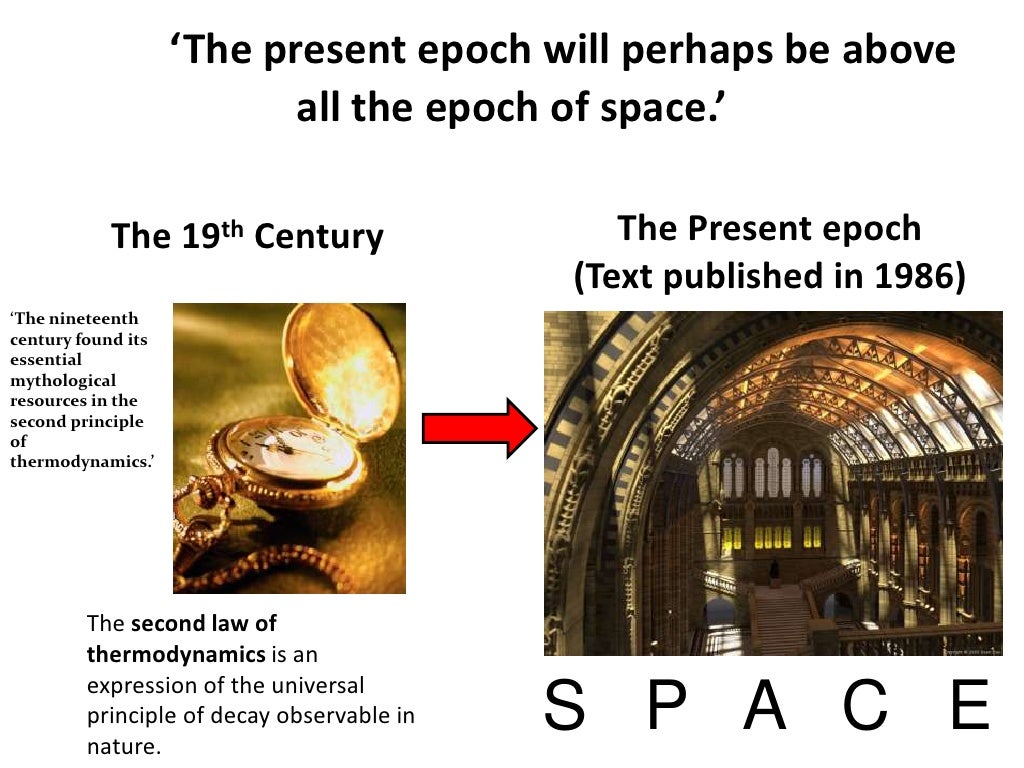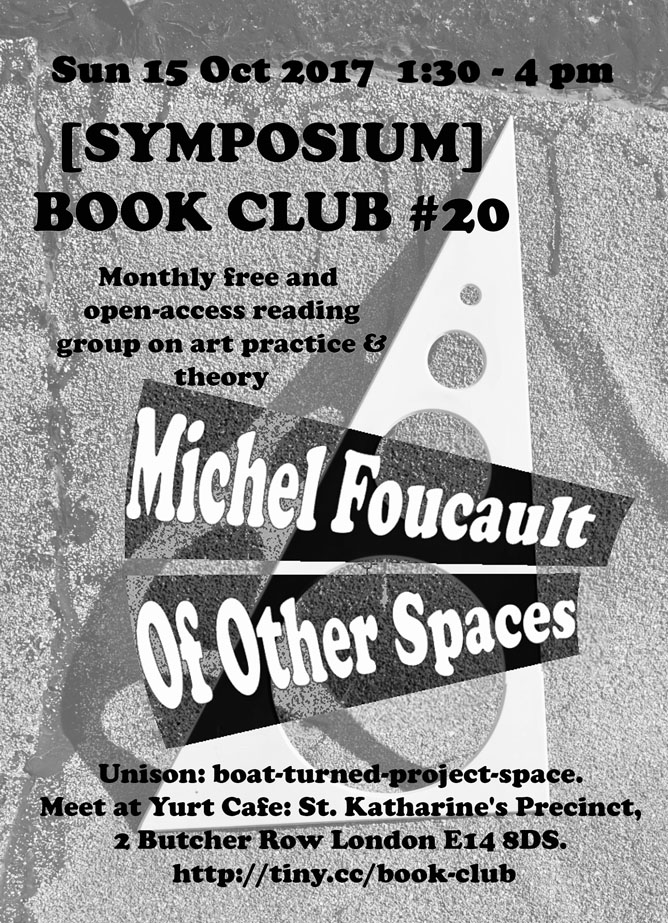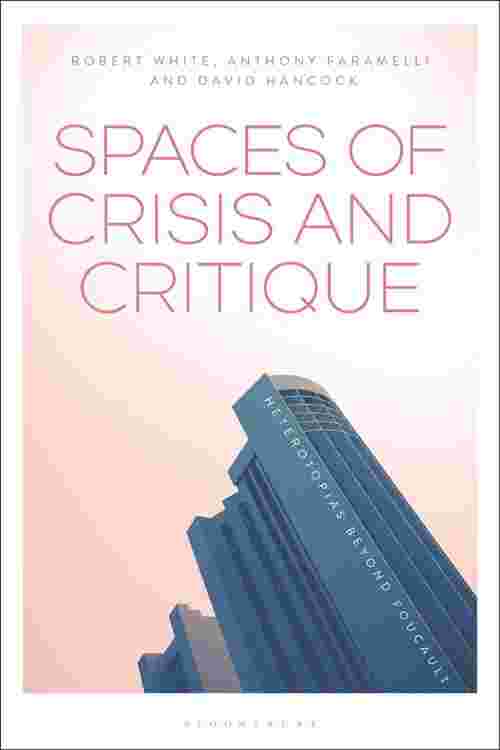
Michel Foucault Of Other Spaces, Heterotopias [Futuristika!]
1. Of Other Space The test entitled "Of Other Spaces" was the basis of a lecture given by Michel Foucault to a group of architectural students in 1967. Although it is not part of his official corpus of work, the manuscript was released into the public domain in 1984 for an exhibition in Berlin, shortly before his death.

Of Other Spaces
7 Foucault, M (1984), Of Other Space, Utopias and Heterotopias, No. 5, October. Architecture ,Mouvement, Continuité, pp.46-49. P2 8 Idem, p2. 4 3.4. Space shaped by qualities Referring to the work Bachelard, mainly the idea of primary perceptions 9and to the phenomenologists Foucault outlines the qualities of contemporary space as the Space of.

Of Other spaces Utopias and Heterotopias AK reads
Foucault, the Other Spaces, and Human Behaviour Authors: Iwan Sudradjat Universitas Katolik Parahyangan Abstract Michel Foucault (1926-1984) was one of the major thinkers whose work offers a.

Of Other Spaces, Heterotopias by Michel Foucault
Arguably the most famous heterotopia that appears in Foucault's work is the Chinese encyclopedia, which originates in the fiction of Jorge Luis Borges. Drawing on this citation of Borges, this article examines Foucault's notion of the heterotopia as it relates to order and knowledge production. Frequently, heterotopias are understood as sites of resistance. This article argues that.

Foucault Of Other Spaces [ART&CRITIQUE]
Archaeologies of the recent past are well-suited to examine these "other spaces": blurring the line between past and present while juxtaposing archaeological, archival, and ethnographic data, they can draw attention to the gaps, contradictions, and alternate orderings that make up the world around us.

[PDF] Of Other Spaces by Michel Foucault, Jay Miskowiec · 10.2307/464648 · OA.mg
A Mobile Heterotopia in a Migrant Camp. Natalie Dixon. Sociology, Political Science. 2019. In this paper, mobile communication is examined in the context of forced migration from an affective perspective using the case study of an informal migrant camp that was established in 2015 at…. Expand. Highly Influenced. PDF. 3 Excerpts.

Michel Foucault ‘Of Other Spaces Utopias and Heterotopias’ Art4001 Critical Debates
In "Of Other Places" Foucault starts by looking at the historical development of western space perception, starting from what he terms "espace de localization" in the middle ages, through the "etendue" (extending) form the time of Galileo to the modern "emplacement". Emplacement means, according to Foucault, that relations between locations in space are the constitutive principle of space.

(PDF) Foucault, Heterotopia Producing Knowledge in Other Spaces Robert Topinka
See Michel Foucault, ‚Of Other Space s,‛ translated by Jay Miskowiec, D iacritics, vol. 16, no. 1 (Spring 1 986), 22-27, for further descr iption of these princi ples.

Commitment / Autonomy sophia kosmaoglou
Texts/Contexts: Of Other Spaces By Michel Foucault Book Grasping the World Edition 1st Edition First Published 2004 Imprint Routledge Pages 9 eBook ISBN 9780429399671 Share ABSTRACT The heterotopia is capable of juxtaposing in a single real place several spaces, several sites that are in themselves incompatible.

Foucault Of Other Spaces [ART&CRITIQUE]
ABSTRACT. The great haunting obsession of the nineteenth century was, as we know, history: themes of development and stagnation, themes of crisis and cycle, themes of the accumulation of the past, the big surplus of the dead and the menacing cooling of the world.1 It is in the second principle of thermodynamics that the nineteenth century found.

[PDF] Spaces of Crisis and Critique by Anthony Faramelli eBook Perlego
OF OTHER SPACES1 MICHEL FOUCAULT The great obsession of the nineteenth century was, as we know, history: with its themes of development and of suspension, of crisis and cycle, themes the ever-accumulating past, with its great preponderance of dead men and menacing glaciation of the world.

fourmonths Idea No. 2 // Heterotopia Image... Architecture drawing, Architecture collage
M. Foucault, J. Miskowiec Published 21 January 1986 Art, History Diacritics The great obsession of the nineteenth century was, as we know, history: with its themes of development and of suspension, of crisis and cycle, themes of the ever-accumulating past, with its great preponderance of dead men and the menacing glaciation of the world.

Of Other Spaces
Of Other Spaces: Utopias and Heterotopias Michel Foucault As is well known, the great and obsessive dread of the nineteenth century was history, with its themes of development and stagnation, crisis and cycle, the accumulation of the past, the surplus of the dead and the world threatened by cooling.

Foucault pendulum at Cleveland Museum of Natural History Foucault pendulum, Learning spaces
Utopian Fiction List of utopian literature Theory Communitas perfecta Communist society Heterotopia Ideal city Sforzinda Pantisocracy Real utopian sociology Third International Theory

Foucault / Other Spaces Future research, Other space, Tech company logos
Michel Foucault (1926-1984) was one of the major thinkers whose work offers a new approach to space and spatial thinking of our modern world.

Of Other Spaces Utopias and Heterotopias By Michel Foucault ART4001 Critical Debates
Summary of Michel Foucault's "Of other spaces" Foucault, M. (2008). Of other spaces (L. De Cauter & M. Dehaene, Trans.). In M. Dehaene & L. De Cauter (Eds.), Heterotopia and the city: Public space in a postcivil society (pp. 13-29). Milton Park, Abingdon, Oxon: Routledge.